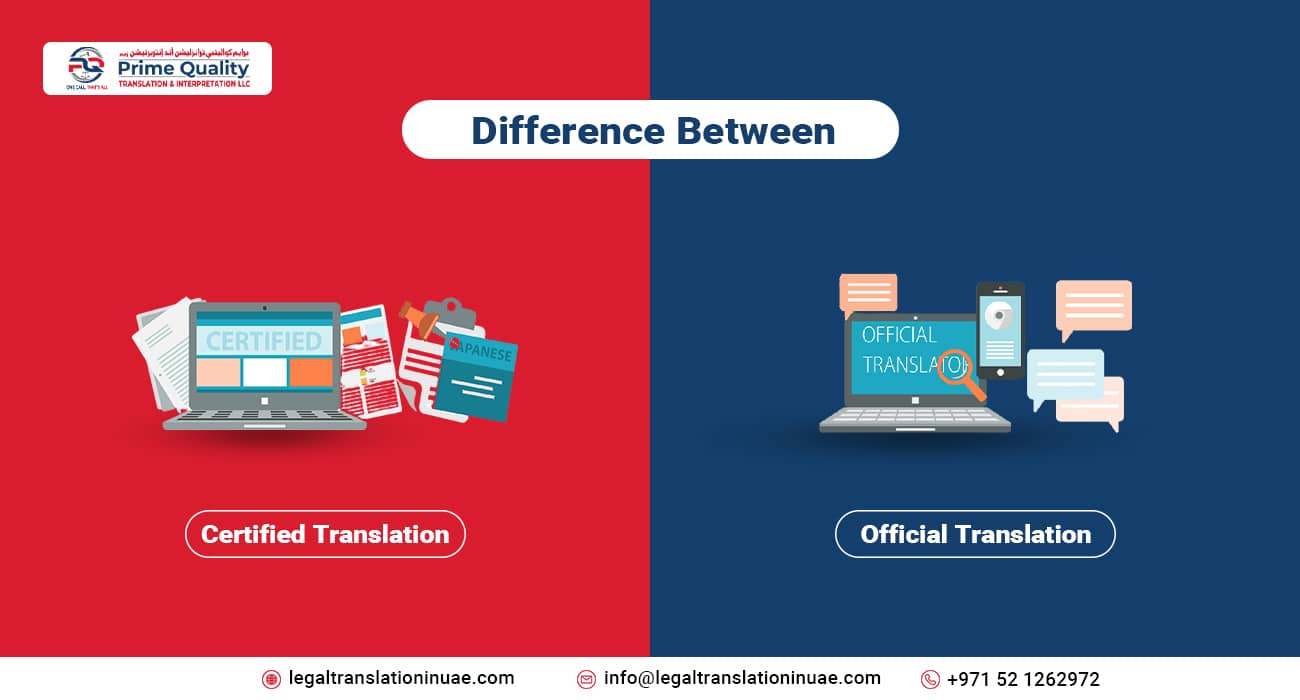The need for accurate and legally recognized translations has become paramount in our increasingly globalized world. Whether you’re dealing with immigration documents, legal contracts, academic transcripts, or other necessary paperwork, it’s essential to understand the difference between certified and official translations. These terms often need clarification but serve distinct purposes in translation and document authentication.
Certified Translation
Certified translations are a common requirement for various official and legal documents. They are typically used when a translated document needs to be submitted to a government agency, academic institution, or any other official body.
Here’s what makes a translation certified:
1. Translation by a Qualified Professional
Certified translations are performed by professional translators who have been recognized and accredited by relevant translation organizations or institutions. These translators possess the expertise and language proficiency necessary to produce accurate translations.
2. Statement of Accuracy
A certified translation includes a signed statement by the translator or the translation company affirming the accuracy and completeness of the translation. This statement also includes the translator’s contact information for verification purposes.
3. Seal or Stamp
Many certified translations bear an official seal or stamp, verifying the document’s authenticity. The seal or stamp typically contains the certification number and the name of the certifying organization.
4. Format Preservation
Certified translations strive to maintain the format and layout of the original document as closely as possible. This includes:
- Replicating Headings
- Signatures
- Other Essential Elements
5. Language Pairs
Certified translators often specialize in specific language pairs, such as English to Spanish or French to German. They ensure that the translation accurately conveys the original text’s meaning in the target language.
Official Translation
Official translations are a broader category of translations that may encompass certified translations but are not limited to them. These translations are often used for various purposes, and their requirements can vary depending on the jurisdiction or organization requesting the translation.
Here are some critical characteristics of official translations:
1. Diverse Uses
Official translations can be used for various purposes, including:
- Business Contracts
- Marketing Materials
- Technical Manuals
They are not necessarily limited to documents requiring legal or official certification.
2. Varied Translators
Official translations can be completed by professional translators, but they can also be handled by bilingual individuals or non-certified translators, depending on the context and the specific requirements of the requesting party.
3. No Certification Requirement
Official translation only sometimes requires a formal statement of accuracy or a seal/stamp. The level of authentication needed depends on the intended use and the policies of the entity requesting the translation.
4. Formatting Flexibility
Unlike certified translations, official translations may not need to replicate the original document’s format precisely. The focus is often on conveying the content accurately rather than preserving the visual layout.
Read Also: How Much is a Transcription and Translation Fee?
The Legal Context of Each Type of Translation
When it comes to the legal context, both certified and official translations have their unique applications. Certified translations are often required for legal documents submitted to government agencies, such as:
- Immigration
- Court Documents
These translations must be accurate and complete, as they carry legal weight and are used as evidence in legal proceedings. On the other hand, official translations are typically used for government or administrative purposes, such as:
- translating official documents in a foreign country
It’s essential to understand the legal context in which each type of translation is used to ensure compliance with relevant laws and regulations.
Who Can Perform Each Type of Translation
Regarding who can perform each type of translation, it depends on the specific requirements and regulations of the country or organization involved. Generally, certified translations must be performed by professional translators recognized and authorized by relevant bodies. These translators often hold certifications or qualifications and have expertise in specific fields.
On the other hand, official translations may be performed by professional or government-appointed translators in some cases. It’s essential to ensure that the translator you choose is qualified and has the necessary skills and knowledge to accurately and legally translate your documents.
Read Also: What is the Salary for an Arabic Translator in Dubai?
The Process of Obtaining a Certified Translation
Obtaining a certified translation involves a specific process to ensure accuracy and legality.
- First, you must find a professional translator authorized like Prime Quality Translation to perform certified translations. Provide them with the original document, and they will translate it accurately, keeping the original format and layout.
- Once the translation is complete, the translator will attach a signed statement certifying the accuracy and completeness of the translation.
- This statement may also include the translator’s contact information and qualifications.
- Finally, the certified translation is often notarized or stamped to authenticate it further. Following this process is essential to ensure your certified translation is accepted and recognized.
The Process of Obtaining an Official Translation
Obtaining an official translation involves a specific process to ensure accuracy and validity.
- Like with certified translations, you must find a qualified translator with the necessary expertise and knowledge. Provide them with the original document, and they will translate it according to the specific requirements of the organization or country involved.
- The translated document may need to be notarized or stamped by an authorized authority to authenticate it.
- Following this process is crucial to ensure your official translation is accepted and recognized by the intended recipients.


